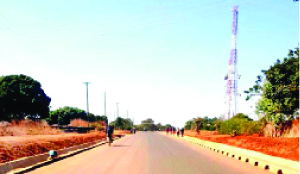By JULIUS PHIRI –
SOMEONE once said: ‘We need to stop thinking about infrastructure as an economic stimulant and start thinking about it as a strategy. This is because economic stimulants produce bridges to nowhere while strategic investment in infrastructure produces a foundation for long-term growth’.
Infrastructure such as the road network has played a crucial role in economic development since time immemorial by enabling relatively fast transportation of masses and goods and services from one place to another.
Although the development of air transportation and telecommunication networks started to compete with road networks during the later part of the 20th century, it is not disputable that road transport still plays a crucial role in the development of countries.
The road network facilitates the movement of people, allowing for social interaction. A high quality road network is essential not only for connecting key urban centres but for improving connectivity of more isolated local communities for whom many public transport options are limited or not available.
The road network consists of a system of interconnected paved carriageways which are designed to carry buses, cars and goods vehicles, the road network generally forms the most basic level of transport infrastructure within urban areas, and will link with all other areas both within and beyond the boundaries of the urban area.
The Patriotic Front (PF) is focusing on opening up Zambia through various roads projects.
According to Chipata Town Clerk Davies Musenge, roads connect remote communities with the areas where employment options are more concentrated and services and facilities more readily available.
By connecting geographic locations, road networks facilitate the transport and movement of people, goods and services.
Investments in road networks reduce the travel time between two locations thereby increasing the robustness of the transportation network and hence reduce the travel costs.
Mr Musenge said the road networks promote trade in any region, hence economic impact of road networks extend in most cases beyond the direct effects due to further rounds of economic activity as a result of the efficient transportation of goods.
The function of a road network is to facilitate movement from one area to another as such it has an important role to play in the urban environment to facilitate mobility.
It furthermore determines the accessibility of an urban area together with public transport options.
In an effort to improve the road network, Government awarded Sable Transport and Construction Limited a contract to tar the township roads in most parts of Eastern Province.
Sable has also worked on roads in Northern, Lusaka and Southern provinces of Zambia.
The Petauke project in Eastern Province cost the Government K129, 832,804.42 and Chipata project gobbled K 95,767,593.02.
In Lundazi, the project which was part of the 91-kilometre stretch of the Chipata – Lundazi Road included 15 kilometres of Lundazi township roads at a cost of K108, 482,246.24.
The tarring has been completed and a partial handover was made to the Road Development Agency (RDA). The gradual handover took place on 24th July, 2015.
Sable Site Agent, Musenge Musenge said the project was in the defect liability for the next twelve months before it is officially handed over to the RDA.
Mr Musenge said the selected Lundazi township roads which had been done include BP Ring Road, Hospital Road, Market Road, Boarding Road, Farmers Training Centre (FTC) Road, Urban Clinic Road, Asian Traders Road, BP Main Road, LSTTC Road and LSTC Road covering a total length of 15 kilometres.
Developing a good road network has many positive effects, such as stimulating the development of commercial activities, urban development and creation of jobs.
For Chipata Township roads, Sable was mandated to carry out works on 1940 Building Road, Mchini- Magazine Road, Kawalala Road, Chimwemwe Road, Pine View South Road, Pine View East Road, DK-Old Jim Road, Magwero Road, Nsingo Road, Hollywood Road, Kafula Road, Lumumba Road, Chipata Motel West Road, Chipata Motel East Road, Findeco and Kalindawalo roads.
Mr Musenge explained that the total length of the project was 29 kilometres.
“All projects are within schedule in terms of progress but our cash flow has been affected due to erratic funding by the Government,” he said.
In Petauke, the Zambian contractor was engaged to tar Nyamphande Road, Show Grounds Road, Mizyu Road, Luangwa Road, Mwase Road, Mwape Road, Chisokone- Muchekeni Road, Ndake Road, Donald Sakala Road, Ekade Road, Musalema Road, Ng’ombe Road, Omelo Mumba Road, Fair View Road, Ukwimi Crescent Road, Ukwimi Road, Anoya Zulu Road, Petauke Urban Clinic and FRA/FTC roads totaling to 19.05Km.
Petauke council secretary Pathias Sumba said he was impressed with the works that have been done by Sable on the township roads in the district.
Mr Sumba said the contractor had done a good job.
Mr Sumba said he was impressed with the pace at which the contractor was moving even though works only started early this year.
“I am really impressed with the pace at which the contractor is moving,” he explained.
Mr Sumba said the tarring of township roads would ease the movement of goods and services in the district.
And Mr Musenge said the road projects being undertaken by Sable would improve trade and connectivity as far as the transport sector was concerned in the border town.







